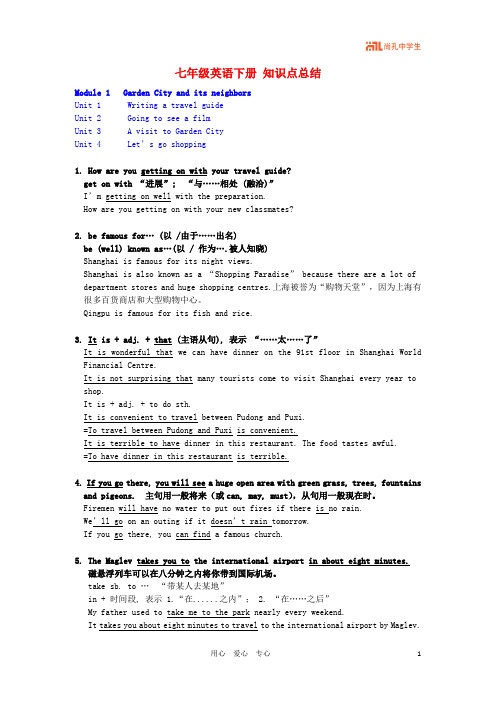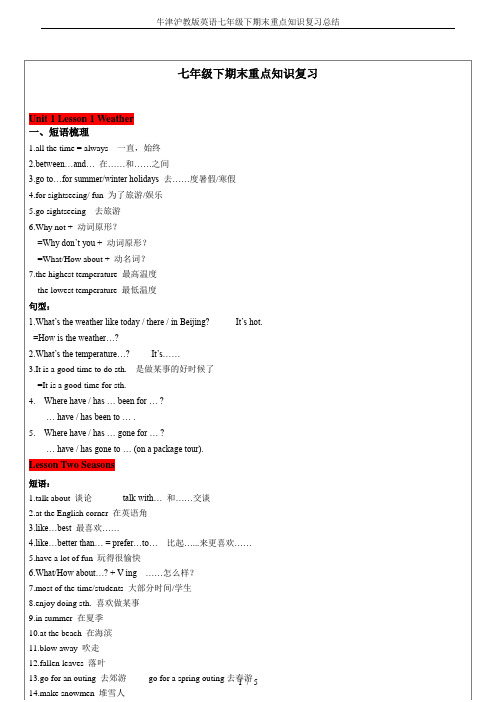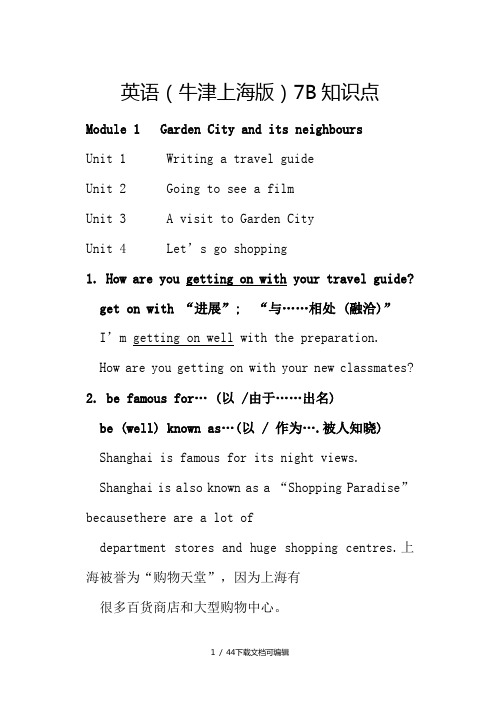(完整word)沪教版牛津英语七年级第二学期7B知识点总结,推荐文档
上海版牛津英语7B资料

七年级英语下册知识点总结Module 1 Garden City and its neighborsUnit 1 Writing a travel guideUnit 2 Going to see a filmUnit 3 A visit to Garden CityUnit 4 Let’s go shopping1. How are you getting on with your travel guide?get on with “进展”; “与……相处 (融洽)”I’m getting on well with the preparation.How are you getting on with your new classmates?2. be famous for… (以 /由于……出名)be (well) known as…(以 / 作为….被人知晓)Shanghai is famous for its night views.Shanghai is also known as a “Shopping Paradise” because there are a lot of department stores and huge shopping centres.上海被誉为“购物天堂”,因为上海有很多百货商店和大型购物中心。
Qingpu is famous for its fish and rice.3. It is + adj. + that (主语从句), 表示“……太……了”It is wonderful that we can have dinner on the 91st floor in Shanghai World Financial Centre.It is not surprising that many tourists come to visit Shanghai every year to shop.It is + adj. + to do sth.It is convenient to travel between Pudong and Puxi.=To travel between Pudong and Puxi is convenient.It is terrible to have dinner in this restaurant. The food tastes awful.=To have dinner in this restaurant is terrible.4. If you go there, you will see a huge open area with green grass, trees, fountains and pigeons. 主句用一般将来(或can, may, must),从句用一般现在时。
Unit7基础知识以及语法点梳理牛津上海版七年级英语下册

Everyof us has a dictionary. (False)
Everyoneof the children likes this game.(False)
Every oneof the children likes this game.(True.)
5.辨析hope, wish
6.everyone (pron)每人,人人= everybody
辨析:everyone, every one, each
everyone后不接介词of
every one既可以指人,也可以指物。
Everyonein our class is interested in learning English. (True)
be unable to do不可以/能够做某事
He is able to speak four foreign languages.
2)vt. enable使...能做enable sb. to do= make sb. able to do使某人能够/可以做某事
The software enables us to access the Internet in seconds.这款软件可以使我们在几秒之内连上网
Speak/Talk of the devil!说曹操曹操就到
5) speak well/ill of sb.赞扬/贬损某人He often speaks ill of others.他常常讲别人坏话。
6) generally/roughly/relatively/frankly speaking总的/粗略地/相对/坦率而言(来说)
拓展:indifferent adj.冷漠的
(完整版)上海版牛津英语七年级第二学期7BUnit1

他和他的表兄弟们相处得好吗?
单词解析
词组辨析
语法夯实
网邵 校杰
For example
• Shanghai is famous for its night views. • 上海以它的夜景而著名。 • Hangzhou is famous for the West Lake. • 杭州以西湖而著名。
网邵 校杰
Unit 1 Writing a travel guide
上海版牛津七年级第二学期
网邵 校杰
单词解析
单词讲解
词组辨析
语法夯实
单词解析
词组解析
语法夯实
网邵 校杰
For example
•
• You’d better buy a travel guide when you are travelling in a foreign country.
单词解析
词组辨析
语法夯实
网邵 校杰
For example
• Shanghai is known as a “Shopping Paradise”. • 上海被誉为购物天堂。 • Venice is known as the City of Water. • 威尼斯被誉为水城。
单词解析
词组辨析
语法夯实
单词解析
词组解析
语法夯实
网邵 校杰
For example
• The reason she was late was that she forgot to set the clock.
沪教牛津版七年级下册7BUnit6知识点规范

place.
He feels
at home himeself.
1/8
沪教牛津版七年级下册 7B Unit6 知识点规范
初中英语情态动词用法详解
【情态动词知识梳理】
情态动词有具体的词义, 但也同助动词一样, 需要与动词原形一起构成句子的谓语, 给 谓语动词添加感情色彩,表示说话人对有关行为或事物的态度和看法,认为其可能,应该, 必要等。另外情态动词没有人称和数的变化,情态动词后必须跟动词原形。
10. 他十岁时就会写诗。 (2). could 在疑问句中,表示委婉的语气,此时
could 没有过去式的意思。如 :Could you do
me 你能帮我个忙吗? —Could I use your pen? 我能用一下你的钢笔吗 ? —Yes, you can.可以。(注意回答)
3. may 的用法: (1) .表示请求、许可,比 can 正式,如: May I borrow your bike? 我可以借你的自行车吗?
1.ater 与 after
later
副词
...... 之后 后来
用于过去时 过去时,将来时
一段时间 +later 单独用
after
介词 连词
(在) ...... 之后 在...... 之后
用于过去时 过去时
after+ 一段时间 after+ 句子
I arrived in Shenzhen on Sunday, two days later Ileft for Shanghai.
她’能t 游. 得
(2) .表示许可,常在口语中。如: You can use my dictionary. 你可以用我的字典。
(word完整版)牛津沪教版英语七年级下期末重点知识复习总结,推荐文档

a(one) third 或one-third三分之一three-fifths五分之三a(one) half二分之一a(one) quarter或one-fourth四分之一three quarters或three-fourths四分之三回答型阅读解题技巧一、专题知识梳理知识点1:回答问题的题型、考点和分值1. 题型:一般疑问句,选择疑问句,反义疑问句,特殊疑问句,主观题2. 考点:对各种疑问句的回答方式及语法的考查(如:时态,主谓一致等)1)一般疑问句的回答:yes or no来回答2)选择疑问句的回答:选择其中的一个或者neither或者both来回答3)反义疑问句的回答:根据事实来回答4)特殊疑问句的回答:why—because/because of, how—by/through doing, how long—for+时间段/since+时间点, when和where提问,介词不能够少,how many或者how far提问时,注意限定词only/more than/ at least/about等5)主观题,注意不能用I think it is interesting或者I think it is good来回答,一定要发表自己的观点和原因。
3. 分值:共12分知识点2:回答问题的技巧1.细节题细节题目比较简单,一般从文中可以直接找到答案,直接抄下来就可以2.归纳总结归纳总结类的题目相对较难,基础好的学生还可以,基础较薄弱的学生一般会抄原文或者自己总结的,但是会出现各种各样的错误二、专题精讲D. Answer the question. (根据短文内容,回答下面问题,12分)It's March, 2050.Frank and Mary Smith wake up in their comfortable house in the morning and switch on the bedroom computer to get the latest news. They used to read the Times, but changed to electronic newspapers many years ago.There is the usual news about space: another space flight has returned from Mars and scientistshave discovered a new planet. Then they turn to business news: the US dollar has risen greatly inShanghai, one of the world's leading business centers. Mary tells the computer to buy 5,000 dollars, andthere is a quick response that it has been done.As they watch the screen, Mary orders one of the household robots to make coffee for them.Frank disappears into the study to join a video conference with his partners aroundthe world. He is a computer engineer, working for several companies. This is histhird job: he used to be in marketing and then television.Mary has a quick look at the shopping channels - the usual selection of electric cars, household robots and cheap travel offers - before picking up the video phone to talk to her assistant. She also hasa job and she is doing medical research. Both she and Frank used to have an office desk in London, butin 2014 they decided to move to the seaside and work from home.Frank and Mary have one daughter, Louise, who also has her own workstation at home. She goes to school only one day a week, mainly to play with other students. Classrooms disappeared in 2030 because there was no longer any need for them: communications systems have made it much easier to learn at home.Louise, now thirteen, is studying Chinese at present, which has become a world language as important as English. Louise has many Chinese friends. They communicate by computer.According to the family doctor, Louise will live to at least 130. Her wish is to work for a few decades (十年) and then spend her time on music and painting.3. Many people didn’t believe Sir Francis Bacon, did they?______________________________________________________.4.Who proved that Sir Francis Bacon was right?_______________________________________________________.5.What do you think of Sir Francis Bacon?______________________________________________________________.(2)Library Rules for TeenagersWe want you to remember these rules for our city libraries.◆Always remember to take your library card with you when you visit the library. If you don’thave your library card, we won’t let you in.◆Your library card is for your use only. If you lend it to others, you will still be responsiblefor (对……负责任) the books on the card.◆If you lose your library card, you can get a new one for free with your ID card.◆Take good care of what you borrow. If you lose it, you will have to pay for it.◆You can keep the books for up to 31 days. Remember to return the books on time.◆Tell us your e-mail address and we will remind (提醒) you when you need to return the books.◆If what you want to borrow has been borrowed by others, you can send us an e-mail. We will keep the book for youwhen it is returned. When it is your turn, we will tell you.Read and answer the following questions(阅读短文并回答问题):80. Who are these rules for?_______________________________________81. Can we lend our own library card to others for use?_______________________________________82. What can you do if you lose your library card?_______________________________________83. What will happen if you borrow a book from the library and lose it?_______________________________________84. How long can you keep a book?_______________________________________85. Why does the library need readers’ e-mail address?_______________________________________。
英语(牛津上海版)7B知识点

英语(牛津上海版)7B知识点Module 1 Garden City and its neighboursUnit 1 Writing a travel guideUnit 2 Going to see a filmUnit 3 A visit to Garden CityUnit 4 Let’s go shopping1. How are you getting on with your travel guide? get on with “进展”; “与……相处 (融洽)”I’m getting on well with the preparation.How are you getting on with your new classmates?2. be famous for… (以 /由于……出名)be (well) known as…(以 / 作为….被人知晓)Shanghai is famous for its night views.Shanghai is also known as a “Shopping Paradise” becausethere are a lot ofdepartment stores and huge shopping centres.上海被誉为“购物天堂”,因为上海有很多百货商店和大型购物中心。
Qingpu is famous for its fish and rice.3. It is + adj. + that (主语从句), 表示“……太……了”It is wonderful that we can have dinner on the 91st floor in Shanghai World Financial Centre.It is not surprising that many tourists come to visit Shanghai every year toshop.It is + adj. + to do sth.It is convenient to travel between Pudong and Puxi.=To travel between Pudong and Puxi is convenient. It is terrible to have dinner in this restaurant. The food tastes awful.=To have dinner in this restaurant is terrible.4. If you go there, you will see a huge open area with green grass, trees, fountains and pigeons. 主句用一般将来(或can, may, must),从句用一般现在时。
沪教牛津版7BUnit9-11知识点整理

沪教牛津版7BUnit9-11知识点整理龙文教育英语教研牛津上海版七年级下册英语Unit 9 知识总结Words:1.段,段落paragraph2.准确无误的;精确的;正确的correct3.顺序;次序order4.体力;力气;力量strength5.骄傲的;自豪的;得意的proud6.阳光灿烂地;光线充足;明亮地brightly7.出汗;流汗sweat8 棒;棍stick粘;贴9 有颜色的coloured10 卷筒;卷盘reel11 线;绳string12 框架frame13 朝;向onto14 系;绑tie15 升起dive16(上下或左右)flap17(船)航行;(人)乘船航行sail18 倾斜;屈身lean19 快速前行speed20(使)弯曲;点头;鞠躬bow21(使)摇摆;摆动sway22 在......中;周围是among23(使)滑动;滑行slide24 酒窝dimplePhrase:1.最后;终于in the end2.炫耀;卖弄show off3.脱下(衣服等)take off4.帆船sailing boatSentences:1.Class,have you read the story about the competition between Mr Windand Mr Sun?同学们,你们阅读过有关风先生和太阳先生比赛的故事吗?2.let’s see who can get his coat off in the shortest time.让我们看看谁能在最短的时间内让他脱外套3.You go first.你先开始。
4.Soon it became warmer and warmer没过多久,天气变得越来越暖和。
5.Then put a tail on the end.然后再(风筝的)末端加上一个尾巴。
6.Their kite is not as colorful as ours他们的风筝不如我们的(风筝)五彩缤纷7.Flowers bow and sway among the grass.花儿在草丛中摇摆Words:1. 冰镇的;加冰块的iced2. 潘趣酒;宾治酒punch3. 小冰块ice cube4. 形态;形式form5. 使冻结;结冰freeze6. 容器的盖子lid7. 秒second8. 喝饮料用的吸管straw9. 牙签toothpick10. 洞;孔;坑hole11. 边side12. (使)连接connect13. 允许;准许allow14. 安全safety Phrase:1. 变凉;冷却下来cool down2. 转变成;将……变成turn into3. 玩耍play with Sentences:1.Frist,get a can of lemonade and different kinds of fruit juice. 首先,取一听柠檬汁和多种不同的果汁2.Next, make ice cubes out of the different kinds of fruit juice. 接着,把各种不同的果汁制成冰块。
沪教版牛津英语七年级第二学期7B知识点总结

沪教版牛津英语七年级第二学期7B知识点总结沪教版牛津英语七年级第二学期7B 知识点总结1.tell sb. (not) to do sth. .告诉某人(不)做某事。
2.现在完成时(has/ have +done)+ since +过去式3.两句话一个连词,三句话两个连词。
4.on Hainan island 在海南岛5.if引导的条件状语从句:在条件状语从句中,如果主句是一般将来时,从句要用一般现在时代替一般将来时。
(主将从现)时间状语从句也有类似的用法。
6.between A and B 在A和B之间。
7.be late for 因……迟到。
8.感叹句:How +adj.+主语+谓语!What+[(a/an) + adj+]名词+主语+谓语!9.in+一段时间,用How soon提问问频率,用How often提问问多长时间for+一段时间,用How long提问。
10. help sb. do sth. .help sb. to do sth. .help sb. with sth. .帮助某人做某事。
11.an architect 一个建筑师。
12.this new pair of 这双新的……these new pairs of (复数)13.ask sb. (not) to do sth. 要某人(不)做某事。
14.try it on 试穿一下。
(代词需要放中间)try on this pair of shorts = try this pair of shorts on 试穿一下这条短裤。
(名词可以放中间,也可以放词末。
)15.a uniform/ university/ useful book/ UFO16.主语为人,用ed结尾的形容词;主语为物,用ing结尾的形容词。
17.see sb./ sth. (not) doing sth.. 看见某人、某物(不)正在做某事。
see sb./ sth. (not) to do sth..看见某人、某物(不)去做某事。
- 1、下载文档前请自行甄别文档内容的完整性,平台不提供额外的编辑、内容补充、找答案等附加服务。
- 2、"仅部分预览"的文档,不可在线预览部分如存在完整性等问题,可反馈申请退款(可完整预览的文档不适用该条件!)。
- 3、如文档侵犯您的权益,请联系客服反馈,我们会尽快为您处理(人工客服工作时间:9:00-18:30)。
沪教版牛津英语七年级第二学期7B 知识点总结1. tell sb. (not) to do sth. .告诉某人(不)做某事。
2. 现在完成时( has/ have +done) + since +过去式3. 两句话一个连词,三句话两个连词。
4. on Hainan island 在海南岛5. if 引导的条件状语从句:在条件状语从句中,如果主句是一般将来时,从句要用一般现在时代替一般将来时。
( 主将从现 ) 时间状语从句也有类似的用法。
6. between A and B 在 A 和 B 之间。
7. be late for 因⋯⋯迟到。
8. 感叹句:How +adj.+主语+谓语!What+[(a/an) + adj+]名词+主语+谓语!9. in+ 一段时间,用How soon 提问问频率,用How often 提问问多长时间for+一段时间,用How long 提问。
10. help sb. do sth. .help sb. to do sth. .help sb. with sth. .帮助某人做某事。
11. an architect 一个建筑师。
12. this new pair of 这双新的⋯⋯these new pairs of (复数)13. ask sb. (not) to do sth. 要某人(不)做某事。
14. try it on 试穿一下。
(代词需要放中间)try on this pair of shorts = try this pair of shorts on 试穿一下这条短裤。
(名词可以放中间,也可以放词末。
)15. a uniform/ university/ useful book/ UFO16. 主语为人,用ed 结尾的形容词;主语为物,用ing 结尾的形容词。
17. see sb./ sth. (not) doing sth.. 看见某人、某物(不)正在做某事。
see sb./ sth. (not) to do sth看.. 见某人、某物(不)去做某事。
18. 连系动词+adj.中考所有所学的连系动词有:be, look(看起来), feel, sound(听起来), smell(闻起来), taste(尝起来), seem(好像), become(变得), turn(变得), grow, get, go, fall.19. well 常用为副词,只有当身体好的时候用形容词。
(eg. I amwell. 我很好。
)20. look for 强调“找”的过程。
find 强调“找”的结果。
find out 强调经过研究、调查而得,“查出;获知;弄清楚”。
21. be busy with sth.. 忙于某事be busy (in) doing sth.. 忙于做某事22. get ready for = be ready for = prepare for 为⋯⋯而做准备。
23. others (名词)= other(形容词)people24. another 三者中的另一个25. the other 两者中的另一个。
26. in charge of sth. 负. 责某事。
in charge of doing sth. . 负责做某事主语常为人,表示主动掌管。
in/under the charge of 由⋯⋯负责=in one's charge. 主语常为物,表示被动,被掌管。
27. be proud of 以⋯⋯为骄傲。
28. in ten years' time = in ten years 在10 年后。
29. enough用法:① enough+可数/不可数名词,表示“足够的⋯⋯”也可以:可数/不可数名词+enough.② adj.+enough。
30. something ,anything ,nothing ,everything 用法:这四个单词后面跟谓语动词时, 都用动词的第三人称单数表示。
anything 一般用于否定句和疑问句中;something 则用在肯定句中。
everything 以单数形式表达所有的概念;nothing 则表示什么都没有。
31. speak +语言tell a lie 说谎;tell a story 讲故事say +说的话、内容、discuss 讨论talk about = 谈论某事;talk to sb. 对某人说话;talk with sb. . 和某人谈话。
32. not ⋯⋯any longer = no longer 不再。
33. look after = take care of 照顾34. waiter 男服务员waitress 女服务员35. funny→ funnier→ funniest36. take (active)part in (积极)参加37. across 介词通过V. +acrosscross 动词穿过zebra crossing 斑马线(可数)38. hardly 几乎不never 从不39. too + adj.+to 太怎么样以至于怎么样=not +adj.+ enough 不足以怎么样40. hope +宾语从句=hope to do sth. . 希望做某事。
41. learn all by oneself = teach oneself 自学。
42. be able to do sth.. = can do sth..能够做某事43. work hard (动词词组)努力工作hard working (形容词词组)工作努力的hard-working (形容词) 勤奋的44. start/ begin to do sth.. 开始要做某事,还没做start/ begin doing sth. 开始做某事,动作正在进行45. have/ has fun.= have/ has a good time玩. 得愉快。
46. 温度下降drop;树叶落下fall47. make/ let/ have sb. do sth.让某人做某事48. think of 想起某事;think about 思考49. 句型:It 's + adj.+(for sb.) to do sth.50. all the time = always 一直51. What's the matter (with sb./ sth.)? =What's wrong (with sb./ sth.)?52. What's up? 最近怎么样?见面寒暄、问候语53. I think so. 我这么认为。
I don 't think so. 我不这么认为。
54. take pills for meals 吃药代替吃饭。
55. stop to do sth. 停下来开始做某事stop doing sth. 停下做某事,停止做的动作56. after + 一段时间,用过去时57. 肯定:would like to do sth.. = want to do sth. 想要做某事。
否定:wouldn't like to do sth. = don't want to do sth. 不想要做某事。
58. homework(不可数) 回家作业have/ has less homework 没有回家作业59. air-conditioner n. 空调air-conditioned adj. 带有空调的60. put up 搭建,抬高价格,提供(资金)61. an ideal job 一份理想的工作62. in the end = finally = at last 最后(反义词) in the beginning 起初at the end of 在⋯⋯末尾(反义词) at the beginning of 在⋯⋯开始63. take off 脱掉(反义词) put on 穿上64. blow down 吹倒65. learn from 学到66. look disappointed 看起来失望的67. turn into 变成,翻译成= change into 变为,换上衣服。
68. be connected with 和⋯⋯有联系69. Let's ⋯⋯, shall we/ shan't we?Let us/ we ⋯⋯, will/ won 't you?Please let us(不包括听说话的一方,所以不能缩写), will/ won't you?70. allow sb. to do sth.. 允许某人做某事。
=let sb. do sth.. 让某人做某事。
71. sb. be not allowed to do sth. 某人不被允许做某事。
72. use sth. to do sth..= use sth. for doing sth.. 用某物来做某事be used for 被用于⋯⋯be used to do sth.. 被用于做某事used to do sth.. 过去常常做某事be used to doing sth. 习惯于做某事。
